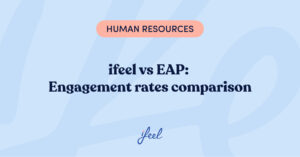Loneliness at work is a psychological experience associated with the absence of the physical company of other people, but also with the experience of emotional isolation from other human beings. In the first case, loneliness can be an enjoyable experience, whether we have chosen it or whether it is something that comes naturally. However, it is also true that it is uncomfortable for some people, probably because it triggers feelings associated with the other kind of loneliness: emotional loneliness.
How does loneliness affect the workforce?
Suppose our employees feel lonely from time to time. There is no need to be alarmed, but what happens if one, several, or many team members are continuously experiencing a sense of isolation or coldness regarding their colleagues, their managers, and the company as a whole? Having the ability to understand, manage and overcome the experience of affective loneliness that all human beings experience from time to time is essential to fostering companies’ emotional well-being. Indeed, their psychological well-being is being affected, and, therefore, so is their experience as employees.
Many circumstances can contribute to this undesirable feeling of loneliness at work. Remote work is one of them, but certainly not the most important. We can be alone at home at work and feel perfectly accompanied, even comforted, by our colleagues. This helps us feel present in the company, even when we are not in the office, because we are a genuine part of the project.
Therefore, it is essential that we also look at factors such as lack of team cohesion, poor leadership, poor onboarding strategies, or a company culture focused on competitiveness as important sources of loneliness at work. When they arise, employees are likely to feel that their company is not looking out for their well-being but is leaving them on their own.
Let’s focus on loneliness at work, understanding it as something inevitable at times but also manageable without negatively impacting our employees’ emotional well-being. It will benefit them and, of course, the organization as well.

3 factors that increase loneliness at work
1. Poor internal communication
Effective and efficient communication helps people feel connected to each other, acknowledged in their achievements, and supported in their challenges. Of course, companies need to understand that communication is a complex process made up of several elements. The most important are the sender, the receiver, the message, and the channel.
Many companies invest a great deal of effort in marketing and advertising, focusing on communicating the organization’s mission, objectives, and mission statement to the outside world.
However, they neglect the quality of internal communication, making it confusing, invasive, or inefficient. The result is that many employees feel they receive messages that do not help them perform their jobs better. They do not know who they should be addressing – or through which channels – at any given time, or they perceive the company’s internal communication to be cold or impersonal. Therefore, fostering good internal communication within the company is crucial to preventing loneliness at work.
2. Ill-designed onboarding processes
There are many moments along the employee’s journey when a person may feel the much-feared loneliness at work. One of the most critical moments is their arrival at the company. The first few weeks after a person joins the team are extremely important to provide them with a fulfilling experience by receiving, welcoming, and training them carefully and strategically helps them feel good and work efficiently.
Many companies do not pay due attention to this factor, assuming that people arrive on their own in companies and must adapt quickly (acquiring autonomy miraculously). This is a pity, given that it is tremendously easy to correct if there is the will to do so. On top of that, they think that there is no need to worry about how someone feels when they first arrive at the company. In reality, few things make the experience of loneliness at work as clear as a bad onboarding process.
3. Competitive culture
Every company wants to meet its objectives and, most importantly, achieve objectives designed to surpass the goals set yearly.
To achieve this, the essential means are the employees: people who have to put a significant amount of commitment, involvement, and affection into their tasks to contribute, in a collective effort, to the achievement of the planned successes.
This can be done by fostering alliances, a sense of shared achievement, and permanent synergies as a source of motivation and the emergence of great ideas. It can also be done by encouraging individualism, the close analysis of each person’s results as if they depended only on themselves. It can also be done by encouraging employees not to outdo themselves every day but to outdo each other so that “the best” prevail in a kind of corporate natural selection process.
Each organization must think about what emotional experiences it wants to stimulate its teams. Some people work very well seeking individual brilliance by outperforming their peers. Others, also very talented, experience the corporate culture of competitiveness as a significant generator of loneliness at work.

Emotional well-being for companies
We hope this post about loneliness at work has helped you understand this issue that can occur in companies and affect workers’ well-being. If you would like more information about our emotional well-being program for companies, request it here, and we will contact your team as soon as possible.
At ifeel, we strive to help companies support their employees, conveying the idea that our professional role must always be compatible with our health. Our team of psychologists, experts in well-being at work, has created an emotional well-being program for companies to improve talent retention, combat absenteeism, and reduce employee stress.
Visit our Resources section and benefit from our Podcasts, HR Guides, or Interviews with top HR managers. In addition, you have at your disposal a Psychosocial Risk Factors Template, which will help you comply with the Labor Inspection requirements.
In addition, thanks to our emotional well-being program, your company’s HR managers can receive personalized, data-driven advice on improving the psychological well-being of their teams. Ifeel’s program offers employees a 360º mental health care service structured at different levels according to their needs. Try our program today to see how it will help you.







